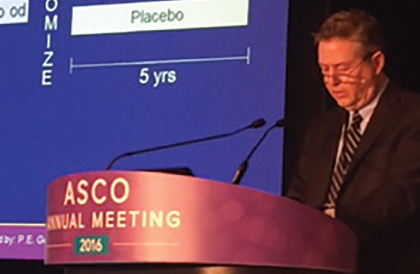Five years of aromatase inhibitor as upfront therapy or after tamoxifen is the current standard of care for postmenopausal women with early hormone receptor–positive breast cancer. A new trial suggests that extending aromatase inhibitor therapy with letrozole for an additional 5 years may improve disease-free survival and reduce the rate of new contralateral breast cancers in this group of postmenopausal women. An extra 5 years of letrozole did not, however, improve overall survival in the MA.17R trial, which was selected as one of the four plenary presentations at the 2016 ASCO Annual Meeting.1
“This is the first large randomized study to show the benefit of extending aromatase inhibitor therapy beyond 5 years. An additional 5 years of letrozole resulted in a 34% reduction in the risk of recurrence, with no worsening of quality of life. No new side effects or emergent symptoms were reported with extending letrozole for another 5 years. Quality of life was not compromised, and this is an important consideration in these women,” said lead author Paul E. Goss, MD, Director of Breast Cancer Research at Massachusetts General Hospital and Professor at Harvard Medical School in Boston.
Results of the MA.17R trial were published in The New England Journal of Medicine2 to coincide with the presentation at the 2016 ASCO Annual Meeting.
Several experts made it clear that these results are not a mandate to keep all postmenopausal women with hormone receptor–positive breast cancer on lifelong endocrine therapy. They agreed that the data should be used in discussions with patients, especially those who are high risk and who can tolerate the side effects of long-term use of aromatase inhibitors.
Nevertheless, Dr. Goss commented to The ASCO Post that it is not the role of “experts” on the spot to make clinical guideline decisions about the applicability of new treatments, but rather, this is the role of international committees.
Study Details
Previous studies have shown that extending tamoxifen or an aromatase inhibitor for 5 years after initial tamoxifen therapy reduces the risk of recurrence, he explained. But most postmenopausal women with early hormone receptor–positive breast cancer currently start adjuvant therapy with an aromatase inhibitor for 5 years. “For this overwhelming majority of patients with breast cancer, it was previously unknown whether the extension of treatment with an aromatase inhibitor beyond 5 years would be beneficial,” Dr. Goss said.
MA.17R included 1,918 patients with hormone receptor–positive early breast cancer who had already taken about 5 years of letrozole and were disease-free. Virtually all the patients enrolled in the trial had not had a break of longer than 6 months while on aromatase inhibitor therapy. They were randomized 1:1 to 5 additional years of treatment with letrozole once daily or placebo once daily.

Paul E. Goss, MD, Director of the Breast Cancer Research at Massachusetts General Hospital and Professor at Harvard Medical School in Boston, presented results of the MA.17R trial. Photo by Elizabeth Janetschek. Copyright 2016, The ASCO Post.
A majority of women in both arms had been treated with tamoxifen for 5 years, and these women were 10 years out from their diagnosis. The rate of adherence to the study regimen was 62.5% in the letrozole group and 62.3% in placebo recipients.
At a median follow-up of 6.3 years, a total of 165 events (disease recurrence or contralateral breast cancer) were reported: 67 in the letrozole group and 98 in the placebo group. A total of 200 deaths were reported, 100 in each group.
The rate of 5-year disease-free survival was significantly improved in the extended letrozole group vs placebo: 95% vs 91%, respectively (P = .01), representing a 34% reduction. This benefit was independent of nodal status, prior adjuvant chemotherapy, time since the last dose of an aromatase inhibitor, and duration of prior therapy with tamoxifen or an aromatase inhibitor.
The rate of contralateral breast cancer was 1.4% with letrozole and 3.2% with placebo, a 58% reduction that was statistically significant (P = .007). The most common site of distant recurrence was visceral, Dr. Goss said.
Update on Extended Aromatase Inhibitor Therapy
- In women with postmenopausal hormone receptor–positive early breast cancer who tolerated 5 years of aromatase inhibitor therapy after tamoxifen, an additional 5 years of letrozole improved disease-free survival by 34% and reduced the risk of contralateral breast cancer by 58%.
- These results should be interpreted with caution and probably are relevant mainly for women at high risk of recurrence.
Most toxicities were similar in the two groups. Letrozole-treated women had more frequent reports of bone pain, bone fracture, and new-onset osteoporosis. There were few treatment-related discontinuations (5.4% with letrozole vs 3.7% with placebo).
Bone fracture occurred in 133 letrozole-treated women and 88 placeb-treated women. The majority of women who sustained a bone fracture during the study were taking bone-protective agents such as bisphosphates, calcium supplements, and vitamin D supplements. These differences in bone-related effects are a consideration when contemplating longer-term aromatase inhibitor therapy, Dr. Goss noted. He added that further bone analyses (looking at factors such as age and on-treatment annual bone density trends) would be conducted, in order to better predict which patients are specifically vulnerable to clinical fractures.
No worsening of quality of life was seen in the letrozole group compared with placebo according to two measures of quality of life: Short-Form 36 Health Survey (SF-36) and Menopause-Specific Quality-of-Life Questionnaire (MENQOL). Only one of eight subscales of the SF-36 found a small difference favoring placebo (ie, role-function physical subscale). No difference was observed between the letrozole and placebo groups in any of the four domains on the MENQOL.

Julie Lemieux, MD
“It is very reassuring for women who want a longer duration of aromatase inhibitor therapy that they can expect a preserved quality of life,” said Julie Lemieux, MD, who reported quality-of-life data from MA.17R at the press conference at the ASCO Annual Meeting.
At the press conference, Dr. Goss pointed out that patients with estrogen receptor–positive breast cancer who are alive without recurrence at 5 years after diagnosis have (at that moment) a worse 5- and 10-year risk of recurrence going forward than patients who are alive and well at 5 years with estrogen receptor–negative disease.
Dr. Goss concluded, “Unlike many anticancer therapies, aromatase inhibitors are readily accessible around the world, and therefore, our results will further improve the outcome of many women with breast cancer. ■
Disclosure: Drs. Goss and Lemieux reported no potential conflicts of interest.
References
1. Goss PE, et al: 2016 ASCO Annual Meeting. Abstract LBA1. Presented June 5, 2016.
2. Goss PE, et al: N Engl J Med. June 5, 2016 (early release online).

